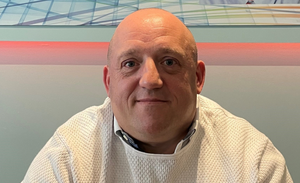The Yorkshire-based British superbike star Dan Linfoot has spoken openly for the first time about how his rapid hair loss affected his mental health.
Dan, who lives in Church Fenton, near York, became increasingly worried about his receding hairline as he became more famous for his exploits on the race track.
Even though Dan risked his life whenever he went out on track, he was worried sick about losing his hair rather than his life, and said he was terrified that he might enter his 30s completely bald.
He commented: “Being completely honest, my self-esteem suffered badly in my mid-20s because of my rapid hair loss. I found I struggled to recognise myself in the mirror and often kept my race helmet on to hide my face.
“I got into the dangerous habit of checking my hairline daily. I suppose you could say I was obsessed. Apart from being in the public eye because of my racing, I was also planning to get married and I know my wife-to-be Carly wasn’t overly keen on my rapidly receding hairline.
“In essence, this was all taking its toll on my mental health. With the nature of my job, I spend a lot of time in front of a camera, so even though I spend a lot of time with a helmet on, I guess there is naturally an element of pressure to look a certain way.
"I was terrified that I would enter my 30s completely bald. I found myself checking my hairline daily - obsessing over it and comparing myself to others. I was on a downward spiral. Of course, I knew that hair loss in males was natural, but I didn't expect it to happen to me so young.”
So, with his wedding looming, Dan started to do extensive research on hair loss and, crucially, looked into the possibility of having a hair transplant.
“During this research, I came across the name of Dr Fas Arshad, the world-renowned hair transplant specialist who, by a wonderful coincidence, was based in Yorkshire. Dr Arshad suggested a hair transplant would be the solution to my problem – and he was right. I haven’t looked back. Indeed, it has transformed my life.
“I felt a weight had been lifted from my mind and Carly was kind enough to say that I looked like a new man. "I was overjoyed with the results. After around three months, I started to see a real difference and I now look happier, and feel healthier, than I have done for ages.”
"To this day, I am very open about my procedures, and how it has impacted me. I want others to know that hair loss doesn't need to define you, there are options available to help.
"I've seen first-hand how debilitating hair loss can be and I sympathise with anybody who is struggling with it and I urge people to be kind. You don't always know how somebody feels on the inside."
Dr Arshad, who owns and runs The Hair Dr Clinic at Leeds Private Hospital, Red Hall House, near Roundhay commented: “I was absolutely delighted to help Dan and am very proud that I have transformed his life. For someone in the public eye like Dan, good mental health and self-confidence are vital. These have now been restored to him.
.
He explained: “Hair loss is a lot more common than one might think. On average, 85 per cent of men, and 40 per cent of women will be affected by hair loss at some stage in their lifetime. Genetics is the most prevalent cause of hair loss, and it is usually hereditary.
"Hair transplant surgery is one of the most popular and effective treatments on the market to address hair loss. The procedure works by surgically removing hair follicles from one part of the scalp, known as the donor site, to the affected area known as the 'recipient site'.
"For Dan, we removed hair follicles from the back of the head and moved them to his hairline. Now, a hair transplant procedure does not create new hair, rather it re-distributes existing hair, therefore there must be enough of it for the procedure to be successful."







